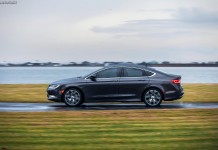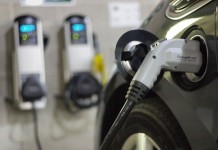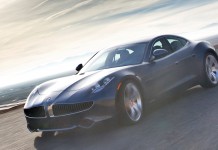The Piaggio Group has officially presented the Piaggio Mp3 250 three-wheel scooter on the Chinese market. Beginning in August, the Mp3 – whose unique technology and safety features have made it a market hit in Europe – will be marketed in the People’s Republic of China through the dealers of the Piaggio Zongshen Foshan Motorcycle Co. Ltd. joint venture, in which Piaggio holds a 45% share. Later on, Piaggio also plans to market the Mp3 Hybrid model in China; the world’s first scooter with a hybrid combustion/electric engine, the Mp3 Hybrid was presented yesterday for display in the Italian Pavilion at Expo Shanghai 2010.
The presentation to the Chinese press at the Expo’s Italian Pavilion was attended by Piaggio Group top management led by Chairman and Chief Executive Officer Roberto Colaninno, the Italian Ambassador to the People’s Republic of China, Riccardo Sessa, and Zuo Zongshen, Chairman and CEO of the Zongshen Group. The presentation was followed by a session of test rides on the Mp3 at the Museum of Contemporary Art in People’s Square in central Shanghai, watched by a large crowd of journalists and the Chinese public.
During the press conference, Chairman and CEO Roberto Colaninno illustrated Piaggio Group growth strategies and prospects in Asia. “The launch of the Mp3 on the Chinese market is part of a new phase in Piaggio Group operations in China and on the Asian continent,” Colaninno explained. “For the first time a product with the Piaggio brand is being offered to Chinese consumers. The vehicle we have chosen presents a high technology and innovation content and has set new standards in active safety, and the hybrid model is a worldwide first for our Group.” The Piaggio Group’s industrial and commercial growth strategy in Asia to date has won it the leadership of the Indian market for 3- and 4-wheel light commercial vehicles, and a significant market share in the Vietnamese scooter sector after the start-up in June last year of Vespa production at the factory in the Vietnamese province of Vinh Phuc. A Vespa model developed specifically for the Indian market is to be manufactured in India: the industrial plan approved by the Piaggio
Board of Directors on 3 June envisages construction of a new factory in India, with an annual production capacity of 150,000 vehicles, and the sales and marketing launch of the new product by the end of 2012. “We are working on additional investments on the Chinese market for three- and fourwheel commercial vehicles, the introduction of new models to join the Vespa and expand our two-wheeler offer on the Vietnamese market, and the development of new models in the automatic ‘Cub’ segment,” continued Roberto Colaninno. “This growth strategy – supported by the Group’s new worldwide organisational structure – will enable us to boost our production and marketing operations in Asia over the next few
years, and generate double-digit revenue growth.”
Another key factor in the Group strategy, whose objectives will be set out in the Three-Year Plan to be examined by the Piaggio Board of Directors in July, will be the creation of R&D Centres to develop electric engines for the Chinese market, in cooperation with leading university research bodies.
Today the Piaggio Group operates in the People’s Republic of China through the Piaggio Zongshen Foshan Motorcycle Co. Ltd. joint venture headquartered in Foshan, in Guangdong province. Established on 15 April 2004, the company is owned with equal 45% shares by Piaggio and the Zongshen Group of Chongqing – one of China’s primary engine and two-wheeler manufacturers, founded and chaired by Zuo Zongshen – and by the Municipality of Foshan (10%). The industrial and commercial joint venture has production operations in China and markets components, engines, scooters and motorcycles based on Piaggio patents and technology in China and around the world. Piaggio Zongshen Foshan Motorcycle – whose results are not included in the Piaggio Group consolidated financial statements – manufactures more than 210,000 vehicles a year, reporting annual turnover equivalent to approximately
80 million euro.







